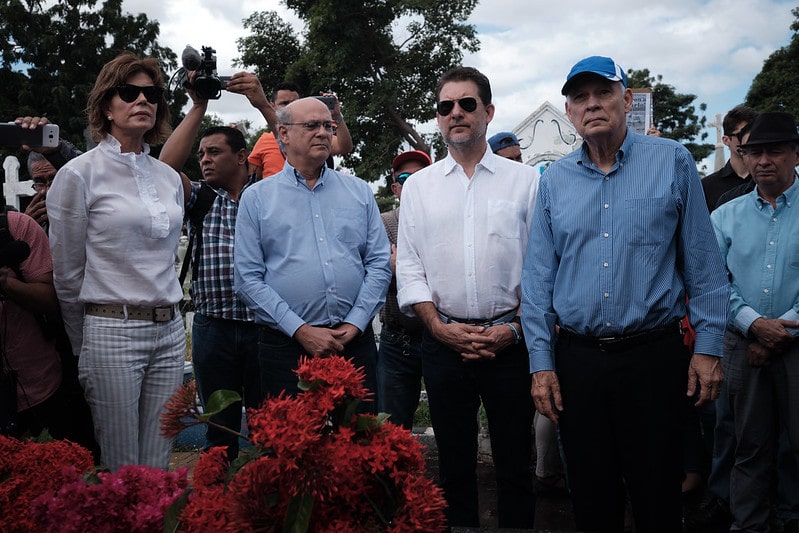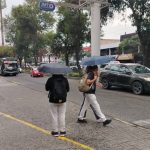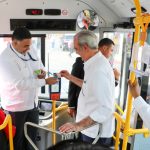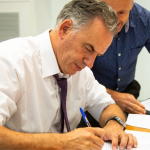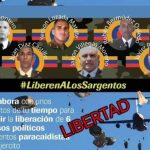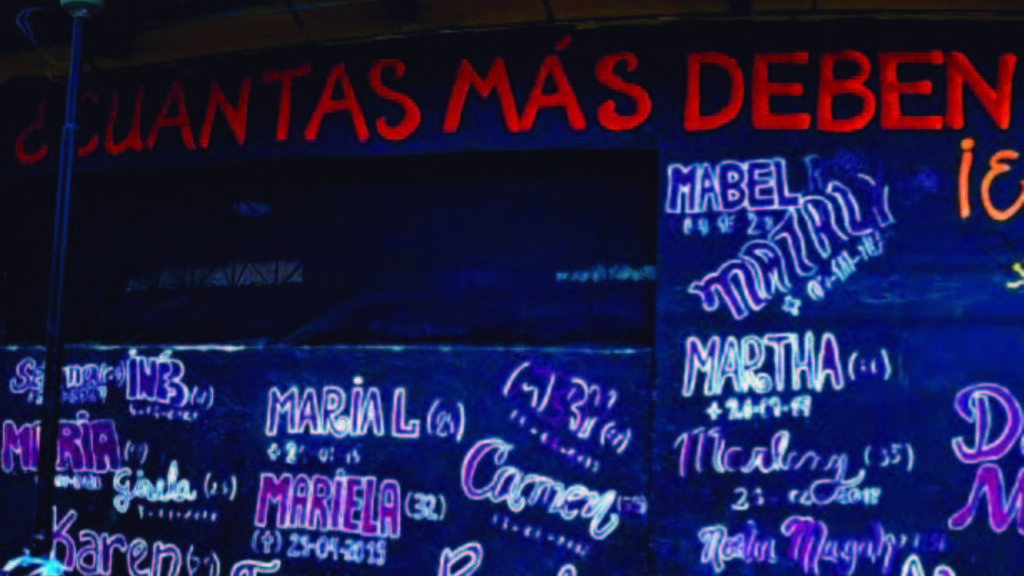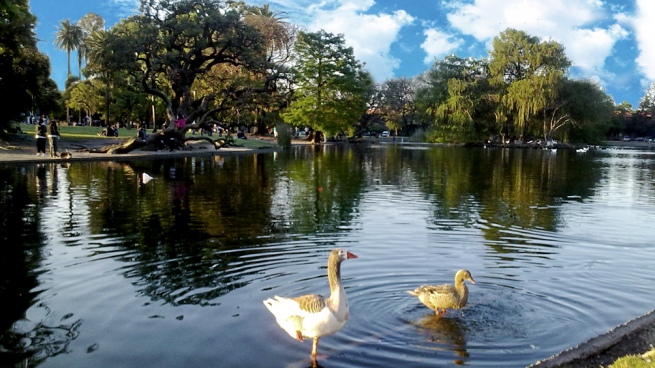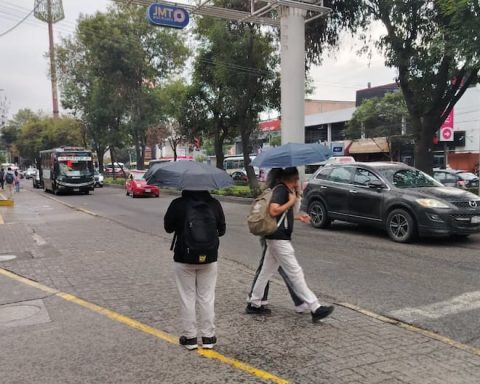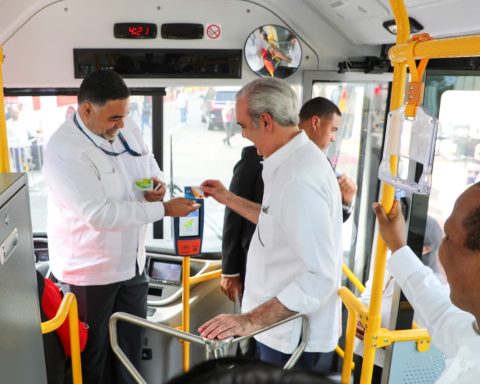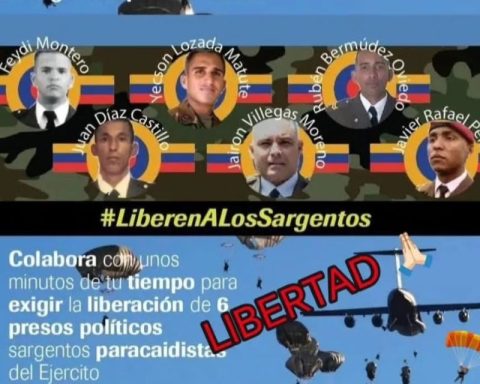Ortega judge Luden Martín Quiroz ignored 1,000 evidence documents presented by the three defenders of the political prisoners Cristiana Chamorro, her brother Pedro Joaquín Chamorro Barrios, their driver Pedro Vásquez and the former workers of the Violeta Barrios de Chamorro Foundation (FVBCh), Marcos Fletes and Walter Gómez by issuing the guilty verdict against all these political prisoners.
The lawyer Maynor Curtis, who is in charge of the defense of the former vice president of the FVCh Pedro Joaquín Chamorro Barrios, also founder of the CxL party, explained in an interview for the program This week– which is broadcast this Sunday, March 13 on Facebook and YouTube due to the censorship of the regime-the irregularities that occurred in this political trial, such as the failure to assess the evidence presented by the defense, the fact that the trial was carried out in the El Chipote prison and that the defenders only had three minutes per hearing to speak with their clients, among several other aspects.
The regime’s Public Ministry requested an eight-year prison sentence for Cristiana Chamorro, for the alleged crimes of money laundering, appropriation and improper withholding of funds. In the case of Pedro Joaquín Chamorro Barrios, he was convicted of improper appropriation and withholding of funds and abusive management, alleged crimes for which the Public Ministry requests nine years in prison.
For Marcos Fletes and Walter Gómez, they ask for 13 years in prison, for the alleged crimes of money laundering, misappropriation and improper retention of funds, abusive management and ideological falsehood. For Pedro Vásquez, he was sentenced for being an alleged cooperator necessary for the crime of money laundering, for which the regime’s Public Ministry asks for seven years in prison.
The five defendants in this trial in which the activities of the Violeta Barrios de Chamorro Foundation have been criminalized were found guilty. Did the Prosecutor’s Office present any evidence to demonstrate the alleged crimes of money laundering or abusive management?
The Prosecutor’s Office presented a large amount of alleged documentary evidence and presented 30 witnesses. Nine civilians. The rest were from the Police and there were experts from the Ministry of the Interior who came to testify. However, in my opinion, those testimonies and evidence that were presented did not prove the commission of the crime of money laundering, abusive actions, misappropriation or ideological falsehood.
So, on what does the judge base the sentence of guilty?
The Prosecutor’s Office made allegations that the commission of the crimes had been proven. However, when it comes to money laundering, that crime was basically mentioned when officers were asked what type of crime they were investigating when they came to raid or arrest people. However, it was something impossible to prove because the expert from the Economic Investigations Directorate of the National Police said that his report was preliminary. He said he found indications of suspicious activity, but not a direct conclusion that money laundering took place. The problem that he had is that he could not prove the dirty origin of the money. One of the defenses asked the expert if the money from USAID (United States Agency for International Development) was dirty money and he said no. And that represented 86% of the donations received by the Foundation, in addition to other NGOs in Europe.
In the case of his client, Pedro Joaquín Chamorro Barrios, accused of abusive management and withholding of funds. He had no authority over the management of funds of any kind in the Foundation. Why are they accusing him?
In the case of Pedro Joaquín, it seemed quite strange to me that they are accusing him of abusive actions. He never authorized anything in the Foundation. Although he was the vice president, he did not write checks, sign checks, and did not receive checks from the Foundation. What the Prosecutor’s Office tried to show as alleged misappropriation is only because in a family account, the family deposited money there to maintain a family property (the Farallón four-apartment condominium in San Juan del Sur). They (The Prosecutor’s Office) alleged that the misappropriation was because employees of the Foundation or Doña Cristiana’s driver (Pedro Vásquez) were going to make the deposits. But that is an activity that most drivers normally do.
The substantive allegation of the Prosecutor’s Office in this case has always been to relate the activities of the Foundation and the activities of the media with the supposed destabilization of the country. In relation to this, the Prosecutor’s Office presented some firm allegation or some evidence.
That was only mentioned in the preliminary report. In the opening statements, the prosecutor did not mention the crime of money laundering, which surprised us. However, in his concluding arguments, he mentioned the alleged misappropriation, the abusive actions and, in the end, he asked that they be found guilty of the crime of money laundering. But the main causes for the crime of laundering is having dirty money and then laundering it, dirty money whose origin is illicit activities.
Did the defendants in this trial have the opportunity to have a due process of defense? What were your conditions as a defense attorney to represent Pedro Joaquín Chamorro?
I had some limitations. For example, they did not let me enter with my computer and that gave me a great disadvantage because criminal proceedings are not only framed in the Code of Criminal Procedure and the Penal Code. There are many other laws to consult and the computer helps us with that both with space and volume. But I was able to put up a full defense and make the opening statements properly. I presented our evidence and attacked their evidence, such as the fact that there was a break in the chain of custody or there were documents introduced into the process in an abnormal way. Another disadvantage that we had is that I could only speak three minutes for each day of the hearing with my client and that is very problematic, because the material defense cannot be exercised, that is, ask my client about some points of the accusation.
This trial was held in the prison of the Directorate of Judicial Assistance. Does it have legal basis, are there elements of nullity that can be invoked in relation to this trial?
At the time we invoke them. There is no legal basis. On the contrary, it violates what is established in the Procedural Code in article 121. There it is established that the hearings must be held in a judicial seat, not in a police headquarters. That is what we allege, they did not give rise and that constitutes a violation of criminal law and cause for annulment.
My brothers Pedro Joaquín and Cristiana Chamorro proclaim their innocence in the few minutes they had to speak before the assassins executing the guilty verdict against them in the “trial” in the Chipote prison and defend the legacy of integrity of our parents.
– Carlos F Chamorro (@cefeche) March 12, 2022
What did the defendants say when they had the opportunity to express themselves in this trial?
Don Pedro Vázquez said that the only thing he had done was do what he has always done. That he was a driver and that was his job, just like he did when he was a member of the National Police. Walter (Gómez) and Marcos (Fletes) stated that they had not committed any crime. That they were honest people and that all they had done was practice their profession.
I remember that Doña Cristiana said that she was being criminalized for training journalists and that international organizations trusted her to donate money for the training of these new journalists. She stated that she was an honest person, that she had never obtained money because she had never needed to obtain money that she would not earn. She also said that her mission was to train young journalists to prepare them for the digital world. That if the international organizations trusted her, it was because she was an honest person who had never misused the money that she had been entrusted to manage. She told the court directly, ‘you are violating my right to freedom of expression that my father defended so much and I am obligated to continue defending that legacy that my father and mother gave me and we are going to continue preparing people , even though they are criminalizing us for doing this’.
Don Pedro Joaquín started in a different way. He said that he was going to take a solemn oath. He swore by God, by the country and told the judge, ‘you represent the country’. He swore by his father, the national hero Pedro Joaquín Chamorro Cardenal. He also swore by his mother (Violeta Barrios de Chamorro), the Nicaraguan peace president, and by his wife who represented his four children. He said that he had never gotten any money from the Foundation. That he had never misappropriated anything that did not belong to him. That the only thing he did for 10 years was manage a family estate in which each of his brothers contributed a part, and so did he. He also said that if anyone could blame him for mismanaging or misusing that money, it would be his brothers who deposited his money in that account.
What is your assessment of the sentences that the Prosecutor’s Office is ultimately requesting against the five defendants?
The penalty specifically for Don Pedro Joaquín Chamorro is excessive. For misappropriation the penalty is one to four years. The Prosecutor’s Office asked for six years for that. In the case of Marco and Walter, the same sentence was four years, but it was said in the trial that it was aggravated by the alleged component of fraud. When they mentioned them, they said that since there were checks, then the scam was aggravated and therefore the same misappropriation. It seems to me an intensive interpretation of the law and therefore the sentences requested are a bit excessive. As for the other sentences, they also seemed strong to me because in the end they are asking for 13 years for Walter and Marcos, they are asking for seven years for a driver and they are asking for eight years for Doña Cristiana, which is a combination of five years for one thing and three years on the other.
There are other elderly political prisoners who have also already been sentenced and sentenced, such as Violeta Granera, Víctor Hugo Tinoco and now Pedro Joaquín Chamorro. who also have health problems. Should these political prisoners be transferred to a situation of house arrest or does the system intend to leave them in the Chipote prison?
I really don’t know exactly what they’re going to do. As for Don Pedro Joaquín Chamorro, I requested that when the sentence is handed down, they change the precautionary measure from preventive detention to house arrest, since he is already 70 years old. The law establishes that convicted persons, upon reaching the age of 70, must have a parole. As for Mr. Víctor Hugo, this week I am going to present a request to change the precautionary measures because his relatives sent me a list of illnesses he suffers from and I am going to present them before the court. As for Doña Violeta Granera, well, I think she could also be put in jail at home. However, until now the only thing that those benefits have had, are characters that have quite serious diseases. Don Pedro has quite a strong illness. He is at the limit of what can be controlled before cancer starts. Then we are going to use those elements to request the change of precautionary measure.
Has this been the longest trial of all those that have been carried out in the Chipote prison?
Yes, because the Prosecutor’s Office presented the 30 witnesses, but also in this particular case, between the three defenses, we offered more than 1,000 documents that proved the boys were not guilty, which in my opinion were not valued by the judge. The judge in his resolution said that they had analyzed the evidence and found them guilty. I hope that in the sentence he specifies and takes into account the documents that we present.
